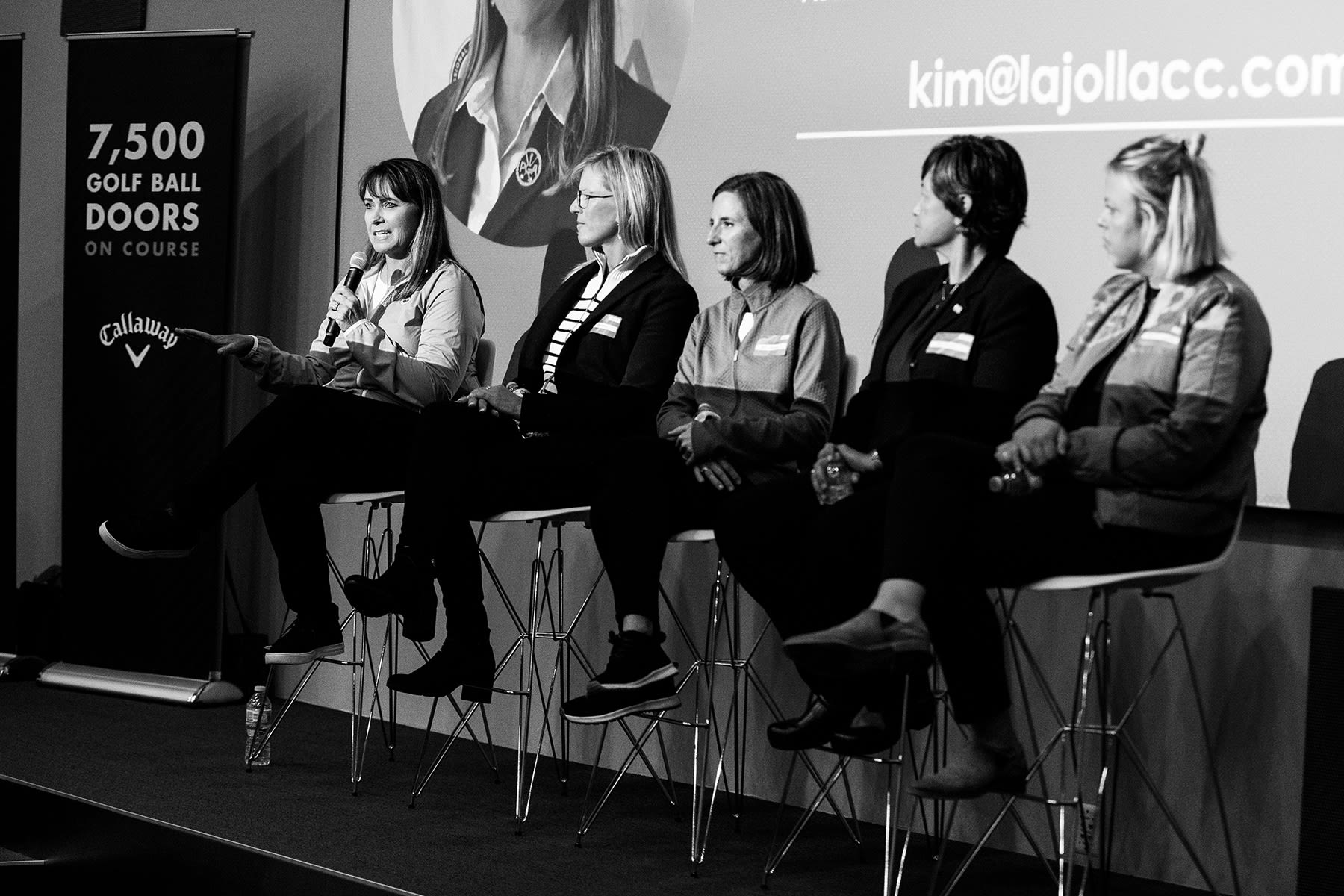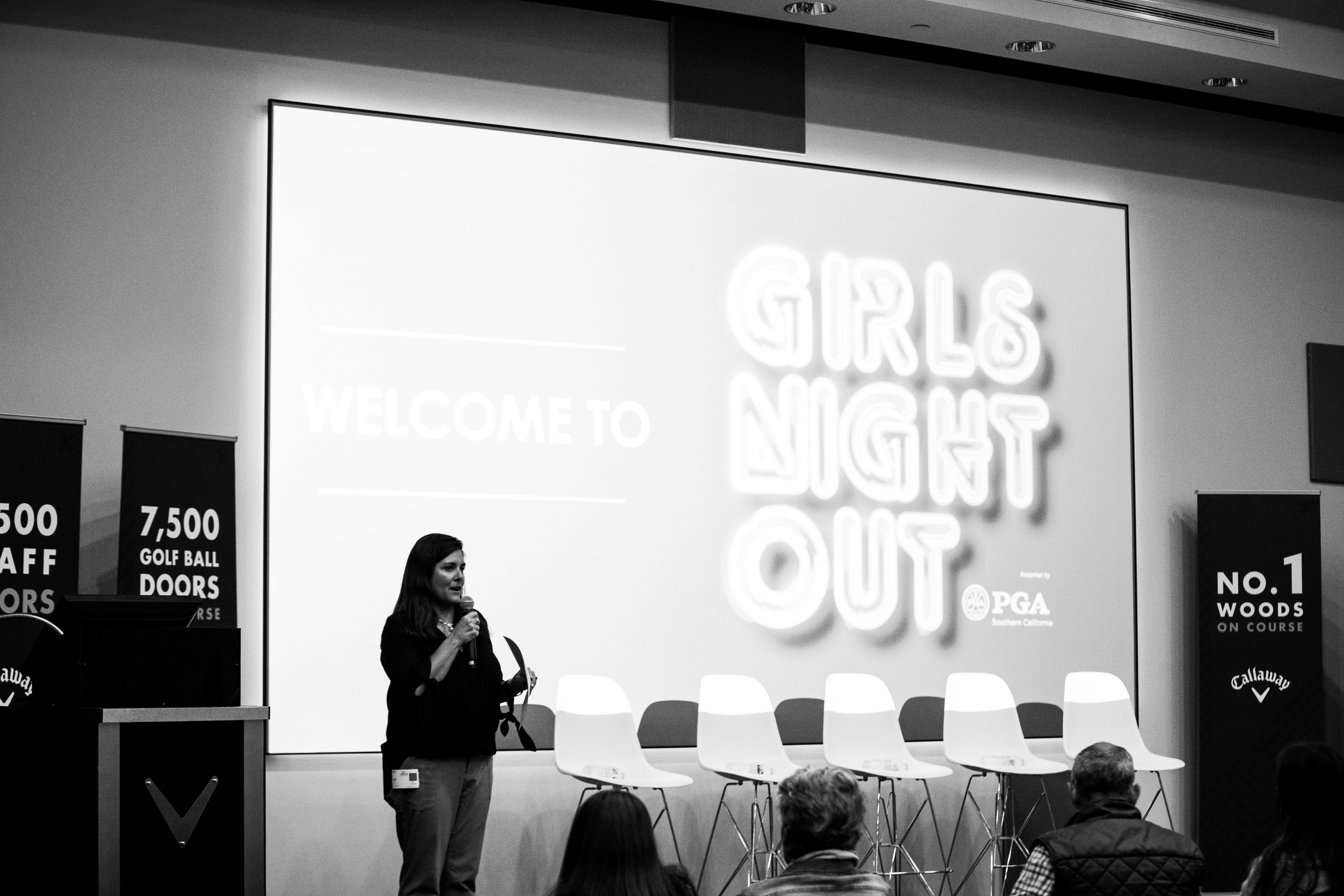Events
The Golf Industry is Innovating to Attract More Women to the Game
By Charles Dillahunt
Published on

Today’s golf leaders are all too aware that the game our parents and grandparents knew isn’t always doing enough to attract newcomers. Particularly women.
But a number of PGA Professionals are coming up with innovative ways to attract both current and new players to both play and work in the sport. Three PGA Professionals from the Southern California PGA Section (SCPGA)—Dr. Alison Curdt, PGA/LPGA; Kim Falcone, PGA; and Nikki Gatch, PGA—are particularly focused on bringing women into the industry.

“I’m working to see the golf industry paradigm be broken in terms of cost, time commitment, and accessibility every day,” says Curdt. “As people’s lives become busier and focused on other activities, golf needs to become more affordable, not take as much time, and needs to be really fun to keep the attention of our current and hopeful consumers. The thought of golf being a stuffy, aristocratic, male-driven sport needs to change, and through PGA of America inclusion efforts and our own in the SCPGA, I believe we are well on our way to doing just that.”
A Doctor in Psychology and one of only two women to reach Master Professional status in both the PGA and LPGA Membership ranks, Dr. Curdt understands well that lives can be made better through golf.
“I think it’s incredibly important for women to find their space in golf, because it's a game you can play your whole life,” explains Curdt, who has been honored with national and sectional awards including recognition from both Golf Magazine and Golf Digest as an instructor. “Even if you aren’t going to be a professional player or PGA Member, golf is often times linked to so many other life benefits for women, such as socialization, business relationships, recreation, and health benefits, that including it in your life, like many men have, can only improve your well-being.”
Curdt serves on both the SCPGA Women’s Committee and Women’s Task Force Group, which are working on the recruitment and retention of women golfers. One of their signature efforts is Girls Night Out, which showcases career paths in golf and introduces young women to role models in the industry.

“Girls Night Out is special to me because we’re showing girl golfers of all levels--college, high school and middle school--how there are so many different ways to include golf in their life, besides just playing the sport,” Curdt says. “We’ve had women leaders from KPMG, Callaway and the PGA, to name a few, speak to young women to highlight the fact that there are so many different career opportunities available to them in this industry.”
Second-generation PGA Members Nikki Gatch and Kim Falcone serve alongside Curdt on both committees, taking inspiration from their parents involvement in the game.
“My father, Jerry Wilhite, PGA, played a major role in me deciding to become a PGA Professional,” says Falcone, PGA Assistant Head Golf Professional at La Jolla (California) Country Club. “He was very involved in governance, having served as Iowa PGA Section President. It drove me to follow in his footsteps, to hopefully one day be as successful as he was. But as far as women golf professionals, I was the first one I ever knew, so I had no female role model to look up to. That’s something I hope to change through our women’s initiatives, like Girl’s Night Out, so that other young women have female leaders to look up to.”
“We realized over 10 years ago that we needed more women in the game,” adds Gatch, the SCPGA’s Chief Operating Officer and Assistant Executive Director. “We began with women’s play days to grow female participation in Section tournament events, and it's now grown into introducing young women to careers in golf as well.”
Gatch and Falcone credit Section CEO and PGA Past President Tom Addis, PGA and 2011 SCPGA Golf Professional of the Year Susan Roll, PGA/LPGA, for their leadership and support in growing female participation in the game and business of golf.
“Tom and Susan always told us that our numbers, at first, weren’t important, but it was just important to get it off the ground,” says Gatch. “That way, when our outreach began to work, women would know there was a place for them in this industry.”
“We have all the support we could ever ask for, including financial, resources and time commitments,” Falcone adds. “Without that, none of this would work. The support from our Section has been incredible, and it’s the main reason these programs succeed.”
As for other PGA Sections looking to replicate the SCPGA’s success in getting and keeping women in golf, Gatch says strategic promotions and collaboration are key.
“You can’t be afraid to get started, everyone has to start somewhere,” Gatch advises. “Once you have the support of your Section’s leadership, anytime you can collaborate and partner with unengaged diverse groups outside of the PGA’s walls, you should, because it’s where the new participants in golf will come from. For example, we partner with the Latina Golfer’s Association around their golf events, which are meant to introduce Latinas to golf in the hope that it leads us to more diverse talent interested in working in the industry.”
If you’re interested in learning more about womens golf initiatives or attending Girl’s Night Out with the SCPGA, contact Nikki Gatch at ngatch@pgahq.com
We invite you to follow us on LinkedIn, Twitter, Facebook, and Instagram @PGA and @PGAWORKS to stay up-to-date with the latest inclusion and diversity initiatives from the PGA.
To learn more about careers within the PGA of America, visit careers.pgahq.com.